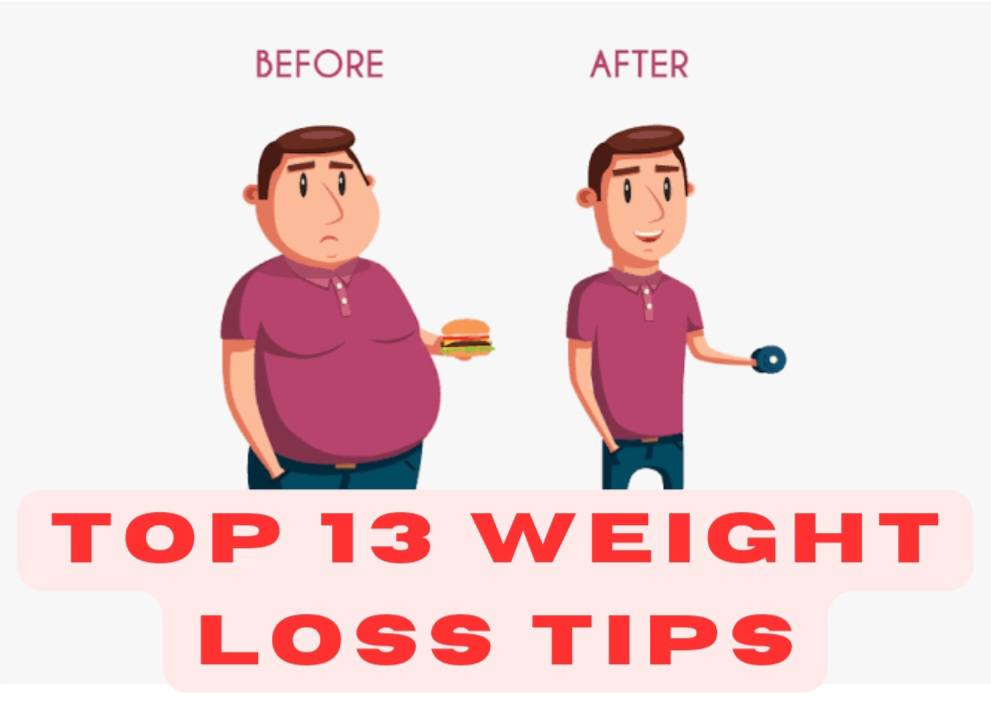Top 13 weight loss tips 202
Set Realistic Goals
Before you start your weight loss journey, set realistic and achievable goals. Goals should be specific, measurable, achievable, relevant, and time-bound. For example, instead of setting a goal to “lose weight,” set a goal to “lose 10 pounds in three months by exercising three times a week and eating a balanced diet.”
Keep Track of Your Progress
Keep a record of your weight loss progress, including your weight, measurements, and body fat percentage. You can use a tracking app, a journal, or a spreadsheet to monitor your progress. This will help you stay motivated and make adjustments to your diet and exercise routine if needed.
Focus on Whole Foods
Eat a balanced diet consisting of whole, nutrient-dense foods. This means including plenty of fruits, vegetables, whole grains, lean proteins, and healthy fats. Avoid processed and packaged foods, which are often high in calories, sugar, and unhealthy fats.
Practice Portion Control
Even healthy foods can lead to weight gain if consumed in excess. Use smaller plates, measure your food, and practice mindful eating to help you control your portions. Focus on eating until you are satisfied, not stuffed.
Drink Plenty of Water
Drinking water can help you lose weight by increasing your metabolism, reducing your appetite, and flushing out toxins from your body. Aim for at least eight glasses of water a day, and try to drink a glass before each meal to help you eat less.
Exercise Regularly
Exercise is essential for weight loss because it helps you burn calories, build muscle, and boost your metabolism. Aim for at least 30 minutes of moderate-intensity exercise, such as brisk walking or cycling, five days a week. You can also incorporate strength training exercises to build muscle.
Find an Accountability Partner
Having a friend or family member who supports your weight loss goals can help you stay on track. You can exercise together, share healthy recipes, and provide each other with encouragement and motivation.
Get Enough Sleep
Sleep is essential for weight loss because it helps regulate your metabolism and hormone levels. Aim for at least seven to eight hours of sleep a night, and try to establish a consistent sleep schedule.
Reduce Stress
Stress can lead to emotional eating and weight gain. Find ways to manage your stress, such as meditation, yoga, or deep breathing exercises. You can also try journaling or talking to a therapist.
Limit Alcohol Consumption
Alcohol is high in calories and can contribute to weight gain. Limit your alcohol consumption or avoid it altogether if possible. If you do drink, choose lower-calorie options, such as wine or light beer, and drink in moderation.
Find Healthy Alternatives
Find healthy alternatives to your favorite high-calorie foods. For example, replace ice cream with frozen yogurt, or chips with roasted vegetables. You can also try new recipes that use healthy ingredients.
Be Patient and Consistent
Weight loss is a gradual process, and it takes time and consistency to see results. Don’t get discouraged if you don’t see immediate changes. Keep following your healthy habits, and the results will come.
Celebrate Your Success
Finally, celebrate your success along the way. Reward yourself for reaching your milestones, such as buying new workout clothes or taking a day off to relax. Celebrating your success will help you stay motivated and on track.
In conclusion, weight loss is a challenging but achievable goal. By setting realistic goals, keeping track of your progress, focusing on whole foods, practicing portion.

